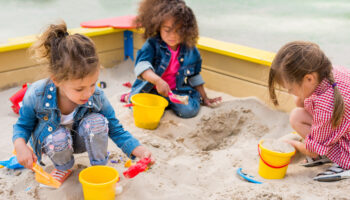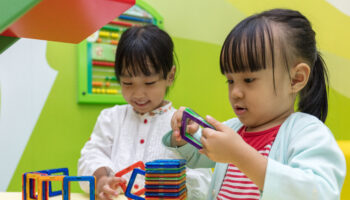Leah Zabari
Yesterday I was in a toddler classroom when two children slowly walked by me. One of the toddlers went up to the other and gently took hold of his friend’s hand. They proceeded to walk around the room together holding hands and interacting. It was such a sweet moment that was only captured by me, the observer. It’s not often I get to see those subtle and sweet peer relationships and it truly made me smile the rest of the day.
Sure, children play with one another every day. I see it happening in the various play centers and outside on the playground. Children naturally want to play with others; however, the question is, how are teachers fostering those peer interactions and relationships? Does the teacher intentionally cultivate awareness of others in the classroom? In toddler classrooms where the children are just learning how to build relationships with their peers, are there activities provided for children of that age to get to know each other or is it just assumed that the children will automatically play with one another and eventually learn their friend’s name? Have you ever pointed to a child in the classroom and asked another child what his or her friend’s name is? Often, when I have asked, “What’s your friend’s name?” the child cannot tell me the friend’s name even though they play together every day! In an article in the Journal of Early Childhood Research, the author stated in his research of an infant classroom that, “The frequent mention of passive, rather than intentional teaching suggests a need for early childhood educators to think more deeply and creatively about meeting the infant’s social needs by taking a more proactive and strength-based approach to fostering peer relationships.”
This took me on a little journey down memory lane to when I was in elementary school. I remember playing games like Ring Around the Rosie, The Farmer in the Dell, or Red Rover. Does anyone remember those? If not, you’re definitely not as old as I am! But those games were classic group games that encouraged peers to hold hands, sing songs as a group, work together, and know each other’s names. In my six years of working as a Program Quality Assessor, I have rarely seen group games encouraging peer connections. I realize that things are different these days, and there might not be space large enough in your program for you to play games like that. So, if that is the case in your program, what is your approach to meeting the social needs of the children in your classroom?
I encourage you to reflect on your current practices. If you are encouraging peer connections, great! What can you do even better? If you haven’t made it a point to nurture peer relationships, I encourage you to “go old school” and play some classic games! I’ve linked a video on a classroom playing The Farmer and the Dell here in case you want to know how to play it with the children in your class.




